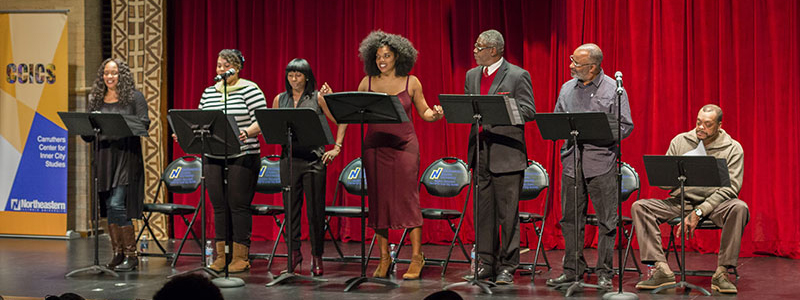Court’s Spotlight Reading Series is Redefining the American Stage

We spoke with Resident Artist Ron OJ Parson and Community Programs Manager Aaron Mays about their Spotlight Reading Series, a yearlong citywide reading series in which Court presents rarely produced classics by authors of color. Their answers demonstrate how enthusiastically the community has responded to this series and why venturing outside the mainstream canon matters.
According to Ron, one of the primary reasons for starting the Spotlight Reading Series was to introduce Court to surrounding communities. But the stripped-down nature of the series also meant that Ron and Aaron have the freedom to choose plays that have historically been overlooked or forgotten. Ron comments that “there’s a lot of plays that are old plays, that are classics, that are not looked upon or thought of as classics, because they’re not the typical classics. One of the things when I first got here that I suggested to Charlie was that we could reinvent what a classic was.” Aaron’s view is similar: “We all know about Arthur Miller, we know about Tennessee Williams, but oftentimes there are playwrights who are left out of the conversation.”
Aaron elaborates that the series is driven by the idea of widening the stage; it resists the idea that there is only room for a set group of works onstage. But lesser-produced plays can be trickier to find. Many are scripts that Ron produced when he was younger, or that come out of Court’s library of anthologies. They cover a variety of perspectives: “a lot of these plays came out of the black theatre movement of the late 60s and early 70s, but we also decided to include Native American plays, Latin plays, we’re looking at an Asian play, so we also want to reach out to that community as well since it is diverse over here,” says Ron. Aaron adds that the nature of the plays also makes a difference: “I think in the curation we try to find plays that have rich language. That could be anything: it could be more poetic, it could be more prose, but I think that’s part of the selection process, language that is rich and vivid and full of color.”
The results have been overwhelming and feedback enthusiastic. There is strong participation in audience talk backs, according to Aaron. “Even during the show you get some call and response, people are reacting and responding,” he notes. Another exciting aspect of the series is that it brings together a diverse variety of community members. Ron has observed that the series’ plays “have mixed the communities. Black people come to the Latin plays, Latin people come to the black plays.” Aaron agrees, commenting that audience members range from high school kids to seniors across a spectrum of ethnicities and income levels. The readings also offer food that reflects the community or neighborhood, which functions as a gathering point for audience members to meet new people, connect with old friends, and be in fellowship with each other.
Ron hopes that the series can expand to include more community involvement, possibly even including seminars and discussions about the plays, or involving other theatres in producing some of the plays. A couple of future readings will be done at the new Green Line Performing Arts Center. Aaron is interested in offering a slot for new work that reimagines or adapts classic texts, a vision that Ron shares.
Because of the readings, many community members have discovered Court’s existence, but it’s important to recognize that the readings also serve a valuable function outside of Court’s mainstage productions. They give much-deserved attention to these important, under-produced works. “The adjective in front of the ‘American stage’ is American’ and what that defines. If we only look at that as one thing, it is a disservice to the American stage,” reflects Aaron. “There are other stories that shape that.” Thus, the Spotlight Reading Series “levels the playing field to say that those who shape it can make it as well.”
Learn more about Court’s Spotlight Reading Series. →
Photo of the Spotlight Reading of The Dance on Widow’s Row by Samm-Art Williams (Jake Newell).